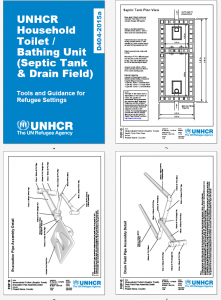
This document contains materials to help UNHCR and WASH actors build post emergency household pour flush toilet and bathing units with septic tanks and drain fields in refugee settings.
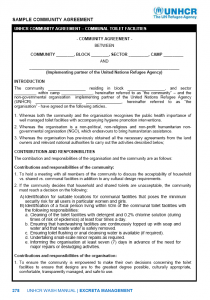
This toilet block management sample community agreement can help define the responsibilities of the different stakeholders in operation and maintenance of WASH facilities from filling up the hand-washing water containers, and keeping the surroundings clean, to providing maintenance.
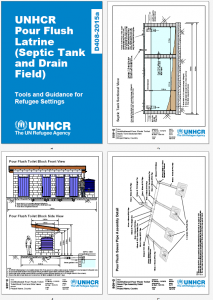
This document contains documentation to help UNHCR and WASH actors build pour flush institutional latrines in refugee settings with septic tanks and drain fields. The package includes: Technical Drawings; Step by Step Construction Drawings; Bills of Quantity; Material and Workmanship Specifications; and Design Calculations.
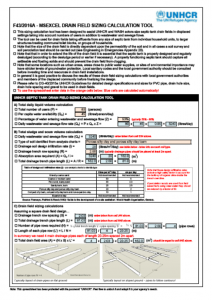
This sizing calculation tool has been designed to assist UNHCR and WASH actors correctly size drain fields for septic tanks in displaced settings taking into account numbers of users, soil type, and wastewater and sewage flows.
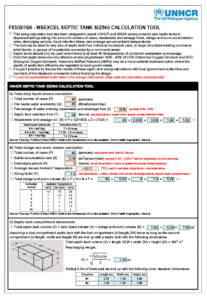
This sizing calculation tool has been designed to assist UNHCR and WASH actors correctly size septic tanks in displaced settings taking into account numbers of users, wastewater and sewage flows, sludge and scum accumulation rates, desludging periods, liquid retention times, and average annual ambient temperatures.
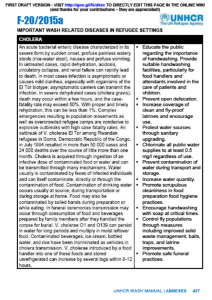
This document provides a quick summary of the most important WASH related diseases for refugee settings and includes a list of recommended control strategies.
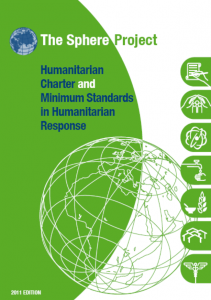
The Sphere Handbook is one of the most widely known and internationally recognized sets of common principles and universal minimum standards for the delivery of quality humanitarian response.
Tags: Bathing Facilities, Capacity Building, Communal Toilets, Cross Cutting, Disability, Disease Vector Control, Drainage, Environment, Excreta Management, Gender, Gender Based Violence, Grey Water Disposal, Handwashing with Soap, Household Water Treatment, Human Right to Water / Sanitation, Hygiene Promotion, Laundering Facilities, Menstruation Hygiene Management, Piped Water Networks, Protection, Public Health, Solid Waste Management, WASH Assessments, WASH Coordination, WASH Monitoring, WASH Programme Management, Water Quality Testing and Surveillance, Water Safety Plans, and Water Supply. Languages: English. Organisations: SPHERE. Categories: WASH Reference Documents.
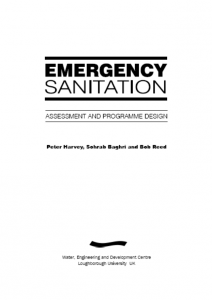
The book Emergency Sanitation: Assessment and programme design has been produced to assist those involved in planning and implementing emergency sanitation programmes. The main focus of the book is a systematic and structured approach to assessment and programme design. It provides a balance between the hardware (technical) and software (socio-cultural, institutional) aspects of sanitation programmes, and links short-term emergency response to long-term sustainability. The book is relevant to a wide range of emergency situations, including both natural and conflict-induced disasters, and open and closed settings. It is suitable for field technicians, engineers and hygiene promoters, as well as staff at agency headquarters.
Tags: Communal Toilets, Desludging and Excreta Transportation, Excreta / Urine ReUse, Excreta Composting, Excreta Management, Excreta Treatment, Household Toilets, Sewerage and Excreta Conveyance, WASH Assessments, WASH Monitoring, and WASH Programme Management. Languages: English. Organisations: WEDC. Categories: WASH Emergency Guidelines and WASH Reference Documents.
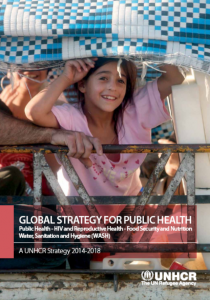
This document describes UNHCR’s global strategy for public health through a set of guiding principles and strategic approaches including protection; age, gender and diversity; equity; access; sustainability; community empowerment; appropriateness and reliability; partnerships and coordination; capacity building; communication and advocacy; integrated approaches; measurement and monitoring; and innovation. The document describes strategic objectives and enabling actions per sub-sector (Public Health, HIV and Reproductive Health, Food Security and Nutrition, and WASH).
Tags: Capacity Building, Disease Vector Control, Excreta Management, Gender, Gender Based Violence, Human Right to Water / Sanitation, Hygiene Promotion, Protection, Public Health, Value for Money, WASH Coordination, WASH Monitoring, WASH Strategy Development, and Water Supply. Languages: English. Organisations: UNHCR. Categories: WASH Guidelines, WASH Operational Guidelines, WASH Policy Guidelines, and WASH Reference Documents.
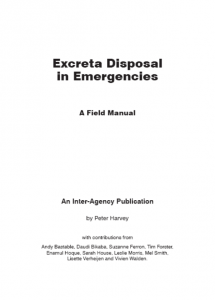
The purpose of the manual is to provide practical guidance on how to select, design, construct and maintain appropriate excreta disposal systems in emergency situations. Relevant situations include natural disasters, relief for refugees and Internally Displaced Persons (IDPs), and complex emergencies, focusing on rural and peri-urban areas. The manual presents a process, which can be followed to assess the current excreta disposal needs and priorities, and to design an appropriate programme to respond to those needs. It can also be used to select appropriate excreta disposal technologies, systems, and hygiene promotion interventions. The manual provides guidance on how to plan, design and construct systems, and how to maintain and promote appropriate use of those systems.
 English
English










